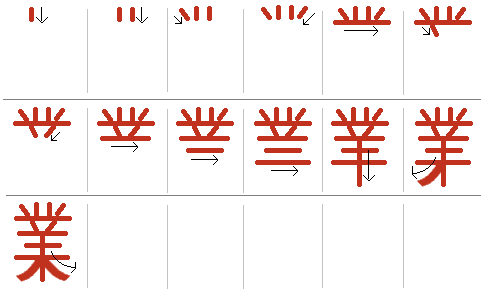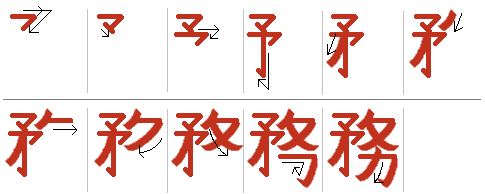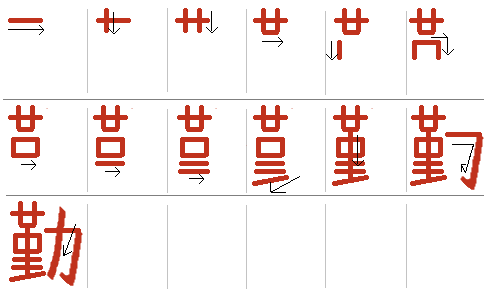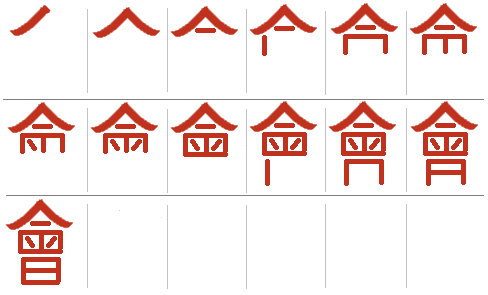Click here for a PDF copy of all our Hanja lessons.
In this lesson, you will learn five characters relating to work or business.
——————————————————————————————————
工 = 공 = Work, Labor
(Korean name: 장인 공)
 Common Words using this Character:
Common Words using this Character:
工學 = engineering
工場 = factory
人工 = artificial
工부하다 = to study
工사 = construction
——————————————————————————————————
業 = 업 = Work, Business
(Korean name: 업 업)
I always found this easy to draw recognize and write because of its similar appearance with 美.
Common Words using this Character:
사業 = business
사業家 = businessman/woman
기業 = company/enterprise
中小기業 = small/medium enterprises
大기業 = large company
業무 = work, business, duty
영業 = business
영業時間 = business hours
영業 中 = to be open (for business)
직業 = one’s job
졸業 = graduation
수業 = class
작業 = work
——————————————————————————————————
務 = 무 = Business, Affairs
(Korean name: 힘 쓸 무)
A little bit on the difficult side, but this fits right into this lesson.
Common Words using this Character:
사務室 = an office
교務室 = an office in a school
근務 = work
의務 = one’s duty
公務員 = a person who works for the government (public servant)
業務 = business, work
——————————————————————————————————
勤 = 근 = Work, Diligence
(Korean name: 부지런할 근)
Common Words using this Character:
出勤하다 = to go to work
퇴勤하다 = to come home from work
出勤時間 = the time you go to work
퇴勤時間 = the time you get off work
出퇴勤하다 = to commute
勤로자 = a worker/laborer
勤務 = work
勤로 = work/labor
——————————————————————————————————
會 = 회 = Meet, Gather
(Korean name: 모일 회)
This word isn’t specifically related to working – it is more related to a group of people. However, its usage in the word “회사” (and its derivatives) warrants me including it in this lesson.
Common Words using this Character:
國會 = parliament
國會의員 = member of parliament/congressman
會사 = company
會사員 = person who works for a company
會장 = chairman of a company/organization
會화 = conversation
조會 = an inquiry
박람會 = a fair/exhibition
전시會 = a fair/exhibition
會의 = a meeting (in work)
大會 = big competition/contest
교會 = church
사會 = society
사會學 = sociology
——————————————————————————————————
I would like to take a minute to try to describe the difference in some of the words that were presented in this lesson. As you saw, many of the words using 업 and/or 무 have similar translations in English. It is easy to be confused about the following words when only looking at their translations. However, a quick explanation will help you understand the differences:
사業 = business
This word is usually used to refer to a business that a person owns. For example, if somebody asks you what you do for a living, you can respond with:
저는 사業을 해요 = I run/have my own business
직業 = one’s job
This word is usually used to refer to one’s job. For example:
직業이 뭐예요? = What is your job?
작業 = work
This word is usually used to refer to physical work/labor that one does, usually with his or her hands. For example:
하루 종일 밖에서 이 작業을 하는 게 힘들어요 = It is hard doing this work outside all day
業務 = work
This word is usually used to refer to administrative work that one does – almost like the opposite of 작업. For example:
業務가 많아서 야勤했어요 = I worked overnight because I had a lot of work to do
영業 = business
This word is usually used to refer to business as it relates to buying and selling things. As such, you will often see signs in windows of stores saying “영업중” meaning literally “we are buying and selling now” which is more accurately translated to “we are open.”
기業 = company
This word is usually used to refer to a company. Some other word/syllables are often placed before 기업 to indicate specifically which type of company is being referred to. For example:
大기業 = big company
中小기業 = small and medium companies
勤務(하다) = (to) work
The verb form of this word literally means “to work”. For example:
저는 大기業에 勤務하고 있어요 = I work at a big company
This is essentially the same as using 일하다:
저는 大기業에서 일해요 = I work at a big company
Notice that ~에 is used to denote the place of work when 勤務하다 is used.
——————————————————————————————————
Okay, I got it! Take me to the next lesson!
Click here for a PDF copy of all our Hanja lessons.





